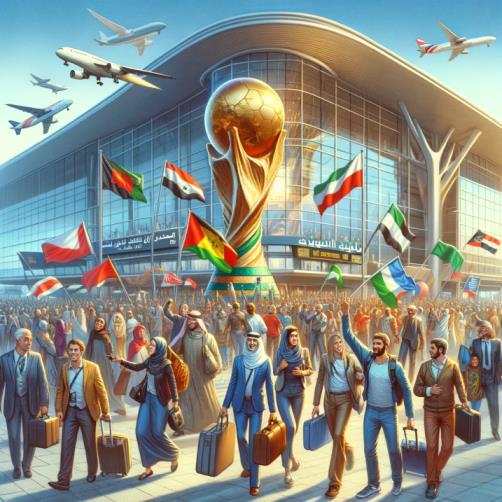
The Economic Impact of Major Sporting Events in MENA
Major sporting events have long been recognized for their ability to transform cities and countries, not just in terms of infrastructure and global reputation, but also economically. The Middle East and North Africa (MENA) region, with its rich history and rapidly modernizing cities, has emerged as a vibrant host for many of these events. From the FIFA World Cup in Qatar to the Formula 1 Grand Prix in Bahrain and Abu Dhabi, the economic implications of these events are vast and multifaceted. In this exploration, we delve into how such spectacles contribute to local economies, spotlighting real examples while maintaining an engaging and informative tone. For those interested in staying updated on sports events and opportunities, platforms like 1xBet (https://1xbet-ar.biz/app/) offer a direct window into the action, complementing the economic and cultural festivities that these events bring to the region.
Economic Benefits: A Closer Look
Infrastructure and Urban Development
Major sporting events often necessitate significant investments in infrastructure, including stadiums, transportation, and telecommunications. This development not only serves the immediate needs of the event but also leaves a lasting legacy for the host cities and countries. For instance, Qatar's preparation for the 2022 FIFA World Cup saw an estimated $200 billion spent on infrastructure projects, including the construction of seven new stadiums and the extensive expansion of the Hamad International Airport.
Tourism and Global Visibility
Sporting events attract tourists in droves, contributing significantly to the local economy through hotel bookings, dining, and other tourist activities. The Dubai World Cup, the world's richest horse race, annually attracts thousands of international visitors, contributing millions of dollars to Dubai's economy. Similarly, the Formula 1 races in Bahrain and Abu Dhabi have significantly boosted tourism, with Abu Dhabi's 2019 Grand Prix weekend alone generating an estimated $1.58 billion in direct and indirect economic activity.
Job Creation and Volunteer Opportunities
The preparation and execution of major sporting events create numerous job opportunities, from construction to hospitality and security. In Qatar, World Cup preparations helped create over 1.5 million jobs in sectors like construction, ICT, and services. Moreover, these events offer thousands of volunteer opportunities, providing invaluable experience and skills development for local populations.
Long-term Economic Impacts
The legacy of hosting a major sporting event can lead to sustained economic benefits. Improved infrastructure can attract future investments and events. Additionally, the global exposure can boost a country's tourism industry for years to come. For example, the 2006 Asian Games in Doha significantly increased Qatar's visibility on the global stage, contributing to a tourism and investment boom that continues today.
Challenges and Considerations
While the economic benefits are significant, hosting major sporting events also comes with challenges. The costs of infrastructure and preparations can be astronomical, and there's always the risk of facilities becoming "white elephants" if not properly planned for post-event use. Furthermore, ensuring that the benefits reach the wider economy and local communities is crucial for sustainable impact.
Case Studies: MENA's Success Stories
- Qatar 2022 FIFA World Cup: Beyond infrastructure, the event is expected to have a lasting economic impact, with tourism and international investment set to rise.
- Abu Dhabi Formula 1 Grand Prix: Has consistently increased tourism and global interest in Abu Dhabi, showcasing the emirate's luxury tourism offerings.
- Dubai Expo 2020: Though not a sporting event, it's an example of how global events can stimulate the economy. It attracted millions of visitors and promoted international business connections.
Conclusion
Major sporting events present a unique opportunity for economic growth and development in the MENA region. Through strategic planning and sustainable practices, these events can leave a positive and lasting impact on the host countries. As we've seen, the benefits extend far beyond the buzz of the competition, contributing to a legacy of development, tourism, and global recognition.
Legal Disclaimer:
MENAFN provides the
information “as is” without warranty of any kind. We do not accept
any responsibility or liability for the accuracy, content, images,
videos, licenses, completeness, legality, or reliability of the information
contained in this article. If you have any complaints or copyright
issues related to this article, kindly contact the provider above.

















Comments
No comment